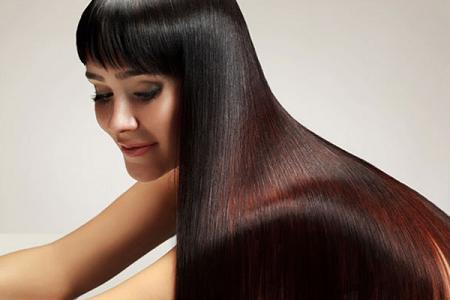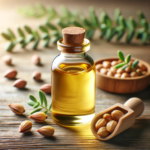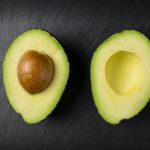
Having luscious and vibrant hair is a desire shared by many. While genetics and hair care routines play a significant role in hair health, proper nutrition is often overlooked. Consuming a balanced diet rich in vitamins and minerals is not only vital for overall well-being but also crucial for promoting the growth and vitality of your hair. In this comprehensive guide, we will delve into the importance of various nutrients and explore how they benefit your locks. By incorporating these essential nutrients into your diet, you can achieve healthy, beautiful hair that shines from within.
Omega-3 Fatty Acids: Nourishment for Resilient and Shiny Hair
Omega-3 fatty acids are essential for maintaining strong and shiny hair. These fatty acids provide nourishment to the hair follicles, making them tougher and more resilient. They also promote faster hair growth. A deficiency in omega-3 fatty acids can lead to a dry scalp, dull hair, and increased hair breakage. Including sources of omega-3 fatty acids, such as fatty fish, flaxseeds, and chia seeds, in your diet can significantly improve the health of your hair.
Vitamin A: The Hair Growth and Scalp Health Booster
Vitamin A is a vital nutrient for hair growth and scalp health. It plays a crucial role in regulating the production of retinoic acid in hair follicles, which is responsible for the development of sebum. Sebum acts as a natural conditioner, keeping the hair smooth and well-conditioned. Foods rich in vitamin A, such as sweet potatoes, spinach, carrots, and mangoes, should be included in your diet to promote a healthy scalp and beautiful hair.
Vitamin B: Stress Relief and Hair Growth
Stress is known to contribute to hair loss, making it crucial to find ways to manage stress effectively. Vitamin B, especially B-complex vitamins, not only helps relieve stress but also promotes hair growth. Inositol, a B vitamin, has been proven to enhance hair growth and prevent hair loss. Including foods like whole grains, leafy greens, citrus fruits, and legumes in your diet will provide you with an adequate supply of B vitamins, ensuring healthy hair growth.
Vitamin C: Iron Absorption and Collagen Production
Vitamin C plays a significant role in hair health by promoting iron absorption. Iron is essential for hair growth as it carries oxygen to the hair follicles, promoting healthy cell division. Additionally, vitamin C is necessary for the production of collagen, a connective tissue found in hair follicles. Collagen provides structural support, making the hair strong and resistant to damage. Including vitamin C-rich foods like citrus fruits, berries, peppers, and leafy greens in your diet will enhance iron absorption and collagen production, resulting in healthy and vibrant hair.
Vitamin D: Activating Hair Follicles for Healthy Growth
Vitamin D is not only crucial for overall health but also plays a significant role in hair growth. It activates hair follicle cells, stimulates hair growth, and helps maintain a healthy scalp. Vitamin D deficiency can lead to a flaccid scalp and conditions like psoriasis. Sunlight is an excellent natural source of vitamin D, and incorporating vitamin D-rich foods such as fatty fish, fortified dairy products, and cereals can further support healthy hair growth.
Vitamin E: Blood Circulation and Hair Shine
Vitamin E is a potent antioxidant that promotes proper blood circulation, including to the scalp. This improved circulation ensures that the hair follicles receive an adequate supply of oxygen and nutrients, promoting hair health and shine. Vitamin E is a fat-soluble vitamin that helps improve the appearance of hair as it grows. Including vitamin E sources like nuts, seeds, spinach, and avocado in your diet can provide the necessary nourishment for healthy and lustrous hair.
Zinc: Antioxidant Support for Hair Follicles
Zinc is an essential mineral that acts as an antioxidant, supporting the immune system and stimulating hair follicles. It plays a crucial role in the production of DNA and RNA, which are necessary for the division and growth of hair cells. Zinc deficiency can lead to hair loss and scalp problems. Including zinc-containing foods such as oysters, pumpkin seeds, dark chocolate, garlic, sesame seeds, and legumes in your diet will help maintain healthy hair follicles and prevent hair loss.
Iron: Combating Anemia and Promoting Hair Growth
Iron is an essential mineral for healthy hair growth. It helps in the production of hemoglobin, a protein responsible for carrying oxygen to the body’s cells, including the hair follicles. Iron deficiency can lead to anemia, a condition characterized by a decreased production of red blood cells. Anemia can contribute to hair loss and poor hair quality. Including iron-rich foods such as lean meats, leafy green vegetables, nuts, grains, and legumes in your diet will help combat anemia and promote healthy hair growth.
Selenium: The Antioxidant Shield
Selenium, an antioxidant mineral, plays a vital role in protecting the body from the adverse effects of sun and atmospheric radiation. In addition to supporting proper body functions, selenium is essential for hair growth and strengthening the immune system. Natural food sources of selenium include Brazilian nuts, sunflower seeds, whole grains, onions, chocolate, and garlic.
Alpha-Linoleic Acid: The Conditioning Shield
Alpha-linoleic acid, an essential fatty acid similar to Omega-3, acts as a shield against moisture depletion in the hair, serving as a conditioner. Fatty acids have also been shown to enhance hair growth. Flaxseeds, flaxseed oil, canola oil, soya oil, pumpkin seeds, pumpkin seed oil, perilla oils, tofu, walnuts, and walnut butter are excellent sources of alpha-linoleic acid.
Healthy Diet and Oral Supplements
To meet the dietary requirements for healthy hair, it is crucial to consume a well-balanced diet that includes the aforementioned nutrients along with other essential vitamins and minerals. Additionally, oral supplements can help bridge any nutritional gaps. However, it is important to remember that natural ingredients can also be applied topically to preserve the beauty and health of your hair.
Harmful Additives in Hair Products
Many commercial shampoos contain additives that can be harmful to the hair. Examples include sodium lauryl sulfate, ammonium lauryl sulfate, ammonium xylene sulfonate, and TEA lauryl sulfate. These additives, along with external factors such as sunlight, toxins, blow-drying, and coloring, can strip the hair of its natural oils. It is advisable to read the labels carefully, opt for natural or homeopathic shampoos, or create a list of ingredients to avoid.
Natural Products for Hair Care
Coconut oil is an effective and safe treatment for scalp and hair health. It contains medium-chain triglycerides that nourish the hair structure and retain antioxidant properties. Biotin, also known as Vitamin H, contributes to the energy transition of food into healthy hair, preventing hair loss and dry, scaly skin. Tea Tree Oil, originating from Australia, stimulates the hair shaft and scalp, helping to remove buildup and normalize pH balance. Lavender Oil, with its antifungal and antiseptic properties, combats bacteria and fungi, promoting hair shine. Homeopathic Arnica can be used topically to address itching and skin flaking.
Conclusion:
Achieving healthy and beautiful hair requires more than just external hair care routines. Proper nutrition is a key factor in promoting the growth and vitality of your locks. By incorporating essential nutrients like omega-3 fatty acids, vitamins A, B, C, D, and E, zinc, and iron into your diet, you can nourish your hair from within and enjoy the benefits of strong, shiny, and vibrant tresses. Remember to consult with a healthcare professional or nutritionist to determine the appropriate dosage and ensure a balanced and individualized approach to your nutritional needs. Embrace the power of nutrition and unlock the secrets to healthy and beautiful hair!






Leave a Reply